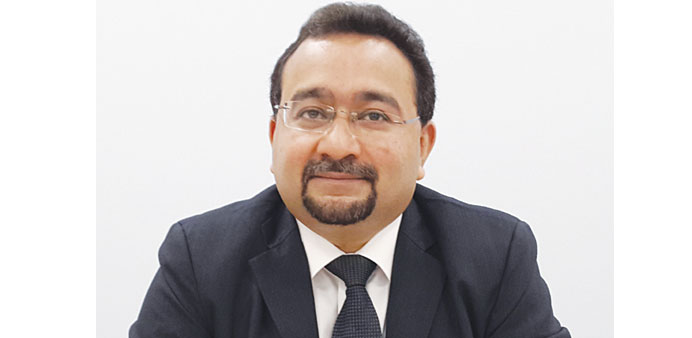Fernandes: Advanced risk management.
Credit card fraud cases recorded in the Mena region is much lower compared to incidents reported worldwide, an official of Visa said.
Visa head of Risk Services for Middle East & North Africa Neil Fernandes told Gulf Times that fraud has always been a concern for financial institutions but with advances in innovation within the finance industry, there are more secure products and services to counter the threat.
“With technological innovations and advances in risk management, we have reduced fraud to near historic-lows with less than six cents per $100 transacted, during a time when Visa’s card transaction volume has grown significantly. In fact, for the Middle East and North Africa region, it sits lower at three cents per $100 transacted,” said Fernandes, who added that fraud rates have declined by more than two-thirds in the past two decades.
But while the region is “doing well” compared to the global average of less than six cents per $100 transacted, Fernandes noted that Visa is seeing a change in fraud patterns moving increasingly to the online channel with the growth in e-Commerce and the ongoing rollout of EMV (Europay, MasterCard, Visa) chip technology around the world.
Quoting statistics released by IMRG (Interactive Media in Retail Group) in its 2012 Overview for the Menap (including Pakistan) B2C e-Commerce, Fernandes said the number of Internet users has “increased tremendously” over the past five to 10 years “but the level of penetration still differs widely: from more than 86% in Qatar to under 15% in Yemen, Algeria, Pakistan, and Iraq.”
To combat fraudulent e-Commerce transactions, Fernandes said Visa provides security measures such as verifying the billing address or the three-digit code imprinted on the back of the card, or using an extra layer of protection such as “Verified by Visa.”
“None of this information can be read electronically from the card, providing extra protection when consumers are shopping online, by phone, or by mail,” Fernandes explained.
“New enhancements to ‘Verified by Visa’ now allow the issuer to prompt for additional validation only for riskiest transactions, allowing for a streamlined checkout experience,” he added.
On the other hand, the “VisaNet” feature enables the company to “see” every Visa transaction that flows through its network.
“This enables Visa to risk-score transactions in real-time with services such as Advanced Authorisation, potentially stopping fraud at the most important point – before it happens,” Fernandes emphasised.
To stop fraud before or as it happens, Fernandes said all Visa transactions must go through the company’s payments processing network or the Visa Advanced Authorisation (VAA).
“With every swipe, our system gets smarter and better at spotting fraud. Based on that, we can deliver more than 100 pieces of fraud intelligence in every authorisation message we process in less than two seconds,” he said.
To prevent fraud from the consumer level, Fernandes advises card holders to sign-up for transaction alerts, which are sent through email or text messages (SMS) within seconds of making a purchase.
Fernandes also discourages the use of predictable PINs (personal identification number) like “1111” or “2222” or weak passwords. For passwords, users are advised to aim for eight of more characters with letters, numbers, symbols and punctuations. Use different passwords for different sites and change them regularly, he said.
Covering the keypad helps shielding one’s PIN from prying eyes. “In the event of a lost card, report it immediately. Call the bank or the organisation that issued your card. They will block your card immediately and organise a replacement,” noted Fernandes.
When using the Internet, Fernandes said fraudsters may use “phishes” or fraudulent emails to trick a person to submit sensitive personal information.
“Visa and banks do not solicit personal information via e-mail, unless the cardholder initiated contact,” he emphasised.
Other precautions, he added, include signing the card and cutting and destroying old cards.

